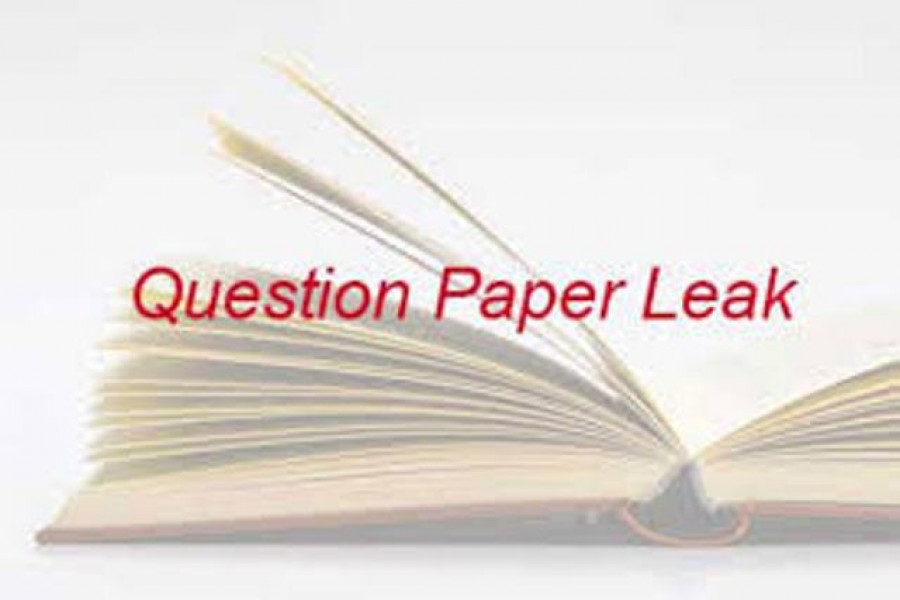
Published :
Updated :

Several print and electronic media reports imply that the Ministry of Education is mulling the idea of scrapping multiple choice question (MCQ) in Secondary School Certificate (SSC) and Higher Secondary Certificate (HSC) Examinations. Apparently, in the Primary School Certificate Examination, the decision to abolish MCQ is going to be implemented from this year. If we go by the media reports, even administrators of some public universities are also going to do the same in conducting their admission tests. Perhaps one positive take from this line of reports is that the policymakers are acknowledging that question leakage has been a grave issue and it needs to be confronted head-on.
It would seem that gone are the days of blaming the technology for the leaking of questions. However, beyond that, on several counts, the measure is not one which appears to be a positive step. One uncertainty with the decision and musing is that as members of the public, we are not aware of what type of questions would replace the MCQ questions. It may be possible that while MCQ questions would be replaced by some other type of objective questions such as the filling in the blanks, picking true/false, and matching etc. If that happens, the MCQ model would be retained in principle, if not in shape; but from the tenor of media reports, it seems that MCQ would be replaced by some form of descriptive questions. And this is where the apprehensions are.
Unlike MCQ questions, the descriptive questions are, by definition, subjective. The subjectivity in the marking of answers of the descriptive type of questions in our public examinations is a well-known issue. Media reports have shown how unrealistic deadlines sometimes create anomalies in the marking of descriptive type of questions by some examiners. Often examiners in the public examination are encumbered by too many scripts; in addition to that, they are given an unrealistic timeline to complete their marking. Hence, the hapless examiners may be forced to cut corners and comply with the official deadlines of the submission of marks. After all, quality marking of descriptive answers is a thankless job, and there can be a reward for expeditious marking, but not for meticulous marking. To put it bluntly, more often than not speed would trump quality here.
Even if the examiners are honest and diligent, there are some inherent elements of subjectivity in the marking of descriptive questions. This would be more pressing in humanities and social sciences than in sciences. Having said that, perhaps many of us who are in this profession of teaching, would in fairness have to acknowledge that the variance in marking of the same script by different examiners is a very real and common possibility. At the risk of subjectivity and being the judge of my own cause (and with all due respect to all my teachers), there have been incidents of severe lack of attention to my scripts simply because of my poor handwriting. Dare I say, the attitude of some of the markers of my scripts have been that a script with shoddy handwriting cannot have anything interesting to be read and is not worthy of full attention, let alone a good mark. Of course, there is no suggestion here that descriptive questions are meritless or should be replaced. The point is here that a descriptive-only type of question in the public examinations or admission tests would be a less balanced one. In particular, for a culling-focused examination, MCQ type questions (designed properly) should be a better way of assessing the quality of the applicant. Even in a language skill assessment examination such as International English Language Testing System or Test of English as a Foreign Language, a significant portion of the test is based on MCQ, which speaks volume of the importance of this type of questions.
Another unfortunate effect of abolishing MCQ question would be that we may unwittingly revert to the days when students preparing for public examinations could follow a pattern of questions and could do well in the examination without any care about thorough learning. For sure, one positive effect of MCQ questions has been that students have been forced to read their textbooks thoroughly and (hopefully) thoughtfully. Indeed, this was perhaps the most pressing reason for the introduction of MCQ system in the SSC examination in the 1990s which was eventually extended to the HSC examination.
It is tough to believe that scrapping the objective type question would be a suitable solution to the perennial problem of question leakage. Possibly, the saddest part of this line of thinking is that our policymakers are acknowledging that we would fail to prevent the leakage the of MCQ questions. This is a very serious indictment of our morality and imagination. Indeed, renowned educators have proposed many solutions to overcome the demon of question leakage. Thus, we would hope that our policymakers would not look for easy solutions such as this. The task of assessment of the knowledge of our young minds deserves a more thoughtful approach from them. Question leakage has to be tackled, but the price of it should not be a downgrading of the quality and rigour of the examination.
Dr. Islam is an Associate Professor at Department of Law, North South University. The views expressed
are the writer's alone.


 For all latest news, follow The Financial Express Google News channel.
For all latest news, follow The Financial Express Google News channel.